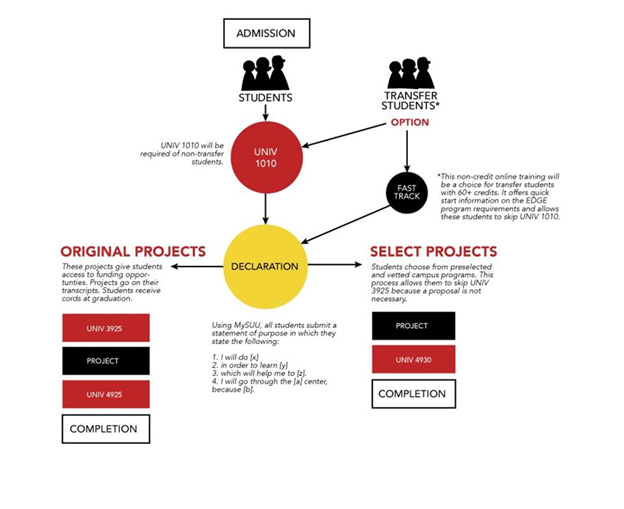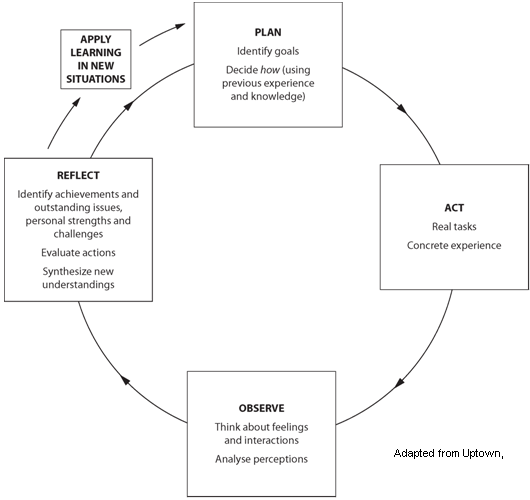NOTE: As of 7/12/2019, the SUU Experiential Education Requirement and EDGE (Education Designed to Give Experience) Program has been retroactively eliminated. Bachelor-degree-seeking students on the 2014-2015 General Catalog are no longer required to complete this program for graduation.
Experiential Education
The SUU Experiential Education Requirement and EDGE (Education Designed to Give Experience) Program
SUU’s Experiential Education requirement is based on established experiential education pedagogy and best practices. The requirement is completed via the EDGE Program. The design and execution of the program affords students hands-on opportunities to gain practical experience while achieving a deep and rich understanding of the process of researching, planning, proposing, completing, and reflecting on a rigorous academic experience. These are skills transferable to any professional life.
The program is designed to adopt the recommended experiential learning standards proposed by the National Society for Experiential Education, including:
- Experiential learning experience must be intentional on the part of the learner and the facilitator
- Students must plan and prepare their experiences to reach a higher level
- Experiences must be authentic, meaning a real world context
- Time must be taken to reflect which transforms simple experience into a learning experience
- Students and facilitators must be prepared for the experience and must have the training and skills to be successful in the experience’s context
- Feedback is necessary for the student and their facilitator to ensure the experience provides a rich learning opportunity
- Outcomes and processes should be systematically documented with regard to initial intentions and quality outcomes
There should be culminating documentation and celebration of the learning to help provide closure and sustainability to the experience.
Experiential Education and Transfer Students
All students must complete the Experiential Education requirements to graduate with a bachelors degree. A “Fast Track” version of the program is possible for transfer students. Transferring of credits from other schools to fulfill EDGE requirements must be approved by the Dean of University College.
SUU’s Engagement Centers
SUU’s academic mission is to provide students with a unique experiential learning opportunity designed to broaden social and cultural perspectives through civic, creative, global, leadership, and outdoor engagement opportunities. Students may utilize learning methods and programs such as undergraduate research, service learning, internships, honors, or other individualized learning processes. Students have many options in choosing at least one program and one engagement center to complete their “Experiential Education Requirement” through SUU’s unique EDGE Program.
Community Engagement Center
The Community Engagement Center promotes learning through meaningful service and active engagement with local, regional, national, and global communities. It upholds the University’s core values of academic excellence, social responsibility, involvement, and personal growth. If helping people and making a difference is a student’s passion, they will fit right in at the Community Engagement Center.
Creativity Center
The Creativity & Innovation Engagement Center promotes the idea that creativity is a crucial feature of any education that promises to prepare students for a future that defies prediction. The Center exists to support students in developing their aptitude for creativity and divergent thinking. It promotes the idea that creative thinking is critical in the lives of educated people and welcomes students who want to learn creativity and enrich their lives and the lives of others through innovative thinking.
Sargon Heinrich Global Engagement Center
The Global Engagement Center fosters cultural understanding and personal enrichment for students to pursue intellectually stimulating programs in a variety of locations worldwide. The Center helps students gain practical and informed awareness of their global citizenship. Students interested in global engagement can study abroad with year-long, semester-long, or short and intensive programs.
Leadership Engagement Center
The Leadership Engagement Center helps foster leadership behaviors that enable students to learn and practice critical thinking, clear communication, empathy for others, and personal integrity. It helps students become conscientious and accountable leaders within their chosen organization or community. It encourages leaders who act for the well-being of others and welcomes students interested in any type of leadership experience.
Center for Outdoor Engagement
The Outdoor Engagement Center helps students appreciate the uniqueness of studying at a University within a half-day’s drive of 11 national parks, national monuments, and recreational areas. It not only promotes engaging with the natural splendor of the outdoors, but also learning about and connecting with the environment and environmental issues that impact everyone. Outdoor work and study are inherently experiential in nature, and students working with the Center can pursue a vast array of opportunities regionally and beyond. The Center works closely with multiple park, recreation, tourism, and wilderness organizations to facilitate rich opportunities for SUU students.
EDGE Program Overview
The EDGE Program contributes to a high-caliber education by allowing students a formal opportunity to create and reflect on their own hands-on learning experience. Required for completion of a Bachelors Degree.
Students Complete One Track:
“Original Project” Track - Students Create a project of their own design
“Select Project” Track - Students select a project to participate in from a designated list

Note
Students will choose one of five Experiential Engagement Tracks to work in to complete this requirement. These include Global, Community, Leadership, Outdoor, and Creativity.
Experiential Education Learning Theory
While the project can be the highlight of the EDGE Program, the learning goals of EDGE are not focused solely on this. Each step in the process is specifically designed to promote experiential learning. This high-caliber learning can be simply illustrated by adapting the concepts of education theorists Peter Honey and Alan Mumford; who in turn adapted David Kolb’s Experiential Learning Theory. This theory states that the stages of learning by experiencing are a cycle of:
- Using experience and knowledge to identify and plan a new experience (Plan)
- Having an experience (Act)
- Reviewing and analyzing perceptions about the experience (Observe)
- Concluding from the experience (Reflect)
- Restarting the cycle by using experience and knowledge to again identify and plan an experience (Plan)

EDGE Mission
The experiential education EDGE Program (Education Designed to Give Experience) is a student-centered process that is relevant, authentic, and potentially transformative. Experiential learning enhances personal, academic, and professional growth by promoting opportunities for engaged and active learning.
Learning Outcomes
The Experiential Education requirement provides academic fidelity to the Liberal Education and America’s Promise (LEAP) “Essential Learning Outcomes” as articulated by the Association of American Colleges and Universities and Southern Utah University. Many students completing the Experiential Education requirement will engage with human cultures and/or the physical and natural world. All students should demonstrate:
- Personal and social responsibility
- Integrative and applied learning
|